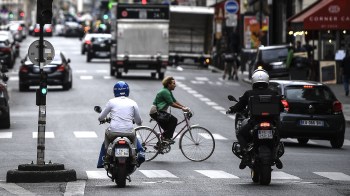Into the ‘Honda Jungle’ of the Amazon
TEXT OF STORY
Tess Vigeland: This week’s auto sales figures provided some solace for carmakers. The industry sold 14 percent more cars last month than it did in June of ’09. The recovery is due in part to global demand, not just U.S. In fact, General Motors announced it’s now selling more vehicles in China than in this country. But one place you won’t find many cars is in the Amazon.
Annie Murphy reports on one Peruvian city of 400,000 people that relies almost entirely on motorcycles. And how one automaker decided to capitalize on that.
Annie Murphy: Dense, swampy rainforest and wide rivers surround the city of Iquitos, Peru. There are no roads in or out, so the city depends on river ports like this one, which makes it hard to get things here, including cars.
Instead, most people use motorcycles and motorcycle taxis, which are like rickshaws mounted onto motorcycle bodies. The streets are full of them, and it’s commonplace to see people carrying groceries, building supplies and even animals on the back of a motorcycle.
Titto Torrejon oversees Honda’s motorcycle line in Peru.
TITTO TORREJON: In one house, you’ll find three or four motorcycles — mom, dad, brother and sister all have a motorcycle. The motorcycle culture here is outstanding.
And a few years ago Honda came up with a simple idea: They built a motorcycle factory right in Iquitos and called it “Honda Jungle.”
TORREJON: Today in Iquitos, we have more than half the market share. About 20-30 percent of the motorcycles we make there stay in Iquitos, and the rest get shipped out by riverboats to other parts of the jungle.
But not everyone is pleased about the surge in motorcycles. Hermogine Scurichivo has driven a moto-taxi since he got laid off his job at a lumber yard last year.
Hermogine Scurichivo speaking in Spanish
He says that driving a taxi puts food on the table, but that these days there are so many motorcycle taxis on the streets, it’s hard to get passengers. In the 1980s, there were just several hundred of these moto-taxis. Today, Iquitos is home to tens of thousands of motorcycles — that’s thanks in part to Honda Jungle.
TORREJON: It’s been successful. Last year, we produced 12,000 motorcycles in Iquitos, and this year we’ve set a goal of 25,000.
Doubling production in one year shows just how successful Honda Jungle is. And it also helps that Peru’s economy is among the fastest growing in the region.
Of course, there is a downside to having the streets overflowing with motorcycles and motorcycle taxis — the noise.
Walter Saxer is the Swiss-born owner of a small hotel in Iquitos, and has lived here for several decades. He’s not pleased about the growing motorcycle business.
WALTER SAXER: With all the street noise, you become aggressive. Just try to talk to somebody, you go crazy.
But the upside is, it’s easy to get where you need to go. And a lot more fun than riding in a car.
In Iquitos, Peru, I’m Annie Murphy for Marketplace.
There’s a lot happening in the world. Through it all, Marketplace is here for you.
You rely on Marketplace to break down the world’s events and tell you how it affects you in a fact-based, approachable way. We rely on your financial support to keep making that possible.
Your donation today powers the independent journalism that you rely on. For just $5/month, you can help sustain Marketplace so we can keep reporting on the things that matter to you.


















